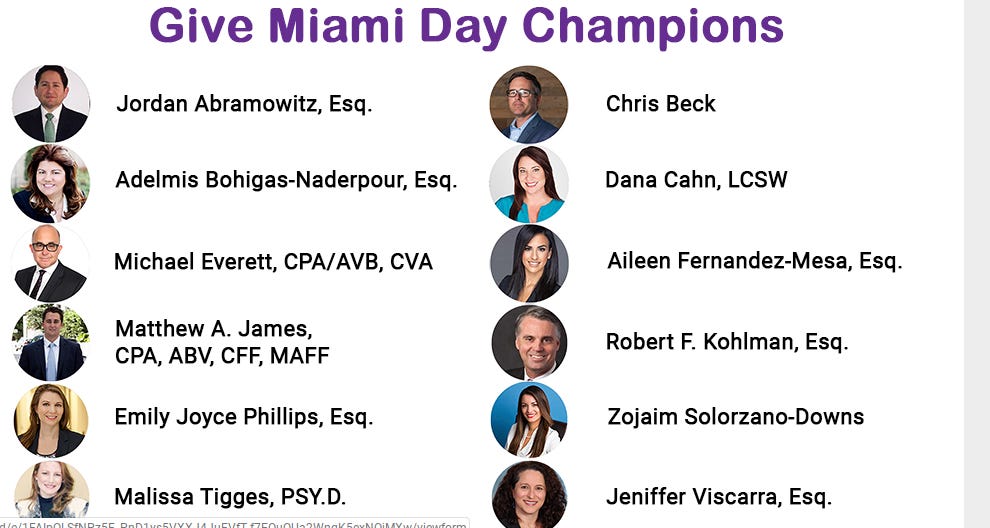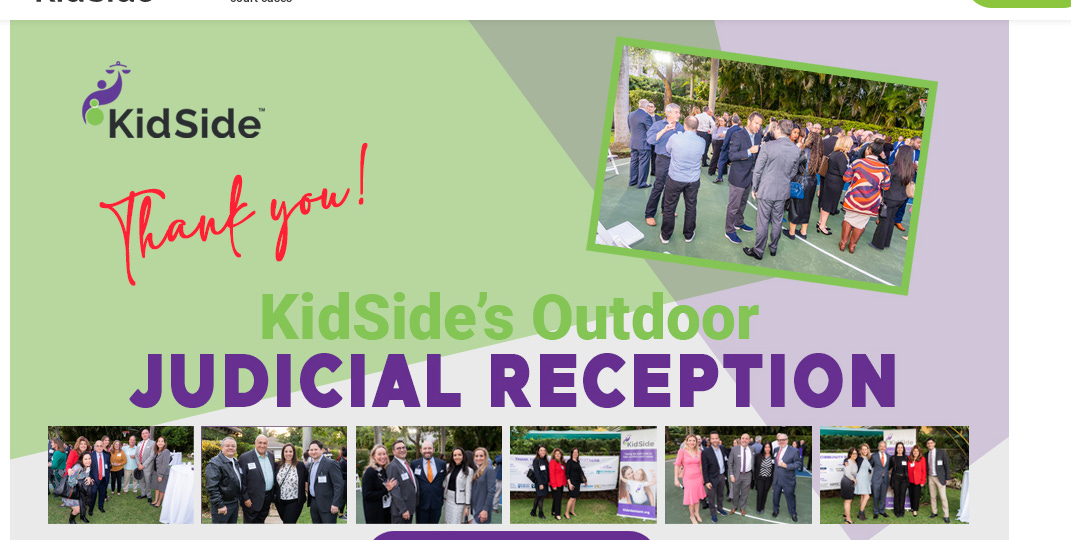It's Called KidSide, but is it on the Kid's side?
The Miami-Dade area 501 (C)3 is called KidSide, but beneath the surface, the non-profit benefits the system which destroys children.
At first glance, the charity called KidSide does good work.
On their website, it states in part, “Without KidSide many kids would fall through cracks in the legal system, with profound consequences.”
Who wouldn’t support that?
The website continues with some more nefarious language, “The impact of high-conflict court cases, like divorce, domestic violence, or abuse, on children is made much worse due to a lack of support for kids in the legal system. An extended, antagonistic legal dispute can have long-term, negative consequences for the children involved. This dynamic can manifest in poor academic performance and peer relationships, substance abuse, pregnancy, and even suicide. Children from low-income families are considerably more vulnerable as their families cannot access essential support and services to help them cope and begin to heal.”
As I’ve previously stated, I believe the term “high conflict” is exploited by court actors. Anyone using it is suspect.
Furthermore, I’ve seen 501(C) 3’s around the country who similarly use it to exploit.
I found one in Texas and two in North Carolina.
The two in North Carolina are called the Council for Children’s Rights (CFCR) and the Children’s Law Center (CLC) of Central North Carolina.
Meanwhile, in Texas, the non-profit is Children 4 Tomorrow.
Below, check out an interview with Amy Palacios (then known as Amy Urban) as she describes her experience with CFCR. Starts approximately forty-one minutes in.
That all these charities use children or kid in their title is no coincidence.
If you’re for the kids, everyone will support you.
Check out the interview below with Amy Palacios (then known as Amy Urban) as she describes her experiences with CFCR, including nearly being arrested on the recommendation of the CFCR guardian ad litem.
The language with all these non-profits is the same.
Here is part of the CFCRs website, “Council for Children’s Rights’ Custody Advocacy Program, or CAP, accepts court appointments in the highest-conflict Mecklenburg County child custody cases, to represent the best interests of the child or children caught in the middle of those cases.”
CLC has similar language, “The Children’s Law Center (CLC) provides a voice for these vulnerable children in court proceedings and advocates for their best interests including safe placement and counseling in CH 50B Civil Domestic Violence cases (DVPO) and CH 50 High Conflict Custody cases. CLC staff attorneys serve as Guardians ad Litem (GAL) on appointment by the District Court Judge in Forsyth and Guilford County.”
As does Children 4 Tomorrow, “We are a non-profit organization that advocate for children in the middle of high conflict parents, creating childhood trauma. We are a solution for the family courts dealing with complex family cases where one parent uses the child as a weapon to hurt or take revenge on the other parent otherwise, known as ‘parent alienation’ - creating a cutoff and psychological abuse.”
Someone wants the world to believe that high conflict child custody cases are a significant problem which requires the work of non-profits.
As I wrote in “Making Divorce Pay” using high conflict like this is a scam to justify the appointment of numerous court appointees.
AFCC didn’t create the term “high conflict” divorces, but the group has done a lot to turn it into a household word. “The challenges posed by high-conflict families were front-and-center issues for most courts, and AFCC members led the way in developing new processes and techniques for working with these challenging family members,” according to AFCC’s website.
“For the last 30 years, mediation and, to a lesser extent custody evaluations have dominated the family dispute resolution landscape,” an AFCC white paper from 2004 stated. “Only recently have a very few court service agencies begun to explore a triage process to select from a menu of services.”
AFCC literature recommends the use of a plethora of court professionals—custody evaluators, guardians ad litem, parenting coordinators, mediators, therapists, etc.—to defuse “high conflict” divorces.
“Parenting coordination is appropriate for high conflict cases dealing with child-related issues,” according to an AFCC manual. What none of the AFCC literature promoting court professional services mentions is that these services are often compulsory and that litigants are charged $250 an hour and more to pay for the services.
The AFCC, or the Association of Family and Conciliation Courts, has a lot to do with creating the environment where cases quickly turn “high conflict” and the court then appoints several professionals to fix the situation: which they rarely do.
In that way, KidSide is a cog in the wheel of this racketeering system. It helps proliferate the term “high conflict” while providing numerous court services to fix it.
The make-up of the board, its advisers, and donors of KidSide also shows corruption.
People who contribute or advise and oversee include Anastasia Garcia, Cindi Kamen, Jordan Ambramowitz, Ed Szcechowics, Judge Scott Bernstein, and Bonnie Sockel Stone.
Sockel Stone is the former law partner of Dori Foster-Morales.
Foster-Morales, Kamen, Abramowitz, Schechowicz, and Bernstein have all been previously exposed in prior articles by me.
Check out Gabe Shapiro below as he describes a case with Garcia, Foster-Morales, and Szcechowicz. (Starting about thirty-eight minutes in)
Jordan Abramowitz was Gabe’s lawyer for some time. Abramowitz represented Eric Satin’s ex in another case. Check out Eric’s interview below: about forty-two minutes in.
Cindi Kamen was the GAL on Eric’s case while Abramowitz represented his ex-wife. Dr. Ed Sczechowics was appointed as a therapist on Gabe and Eric’s case.
These are the very folks who exploit the term “high conflict” for financial gain.
Foster-Morales charged hundreds of thousands in Gabe’s case, representing Gabe’s ex-wife.
Anastasia Garcia was the GAL on Gabe’s case and she was able to have Jacqueline Valdespino also appointed to be her lawyer, all at Gabe’s expense.
Gabe said he was told it was temporary, only while an investigation was conducted; this has dragged for nearly a year and caused him to be separated from his two children for many months.
Foster-Morales also throws her weight around in other ways. For instance, she has been able to get the judge, Ivonne Cuesta, to order Gabe to pay Foster-Morales bills, the bills for the GAL- Anastasia Garcia, and for the attorney Garcia hired- Jacqueline Valdespino.
Valdespino promptly sent Gabe her first bill, including a retainer of $7,500.
Many of the biggest heavy hitters in the Miami family court system play a role in KidSide. Most of what I started referring to as the “Miami Family Court Mafia” has a connection to KidSide.

I am told that it is the brainchild of Dana Cahn, who runs a reunification therapy service called FACES, Facing Adverse Childhood Experiences for Children.
Reunification therapy, including the likes of Family Bridges and Randy Rand, is almost always court ordered.
As I have previously written, I consider all these reunification therapies to be quackery.
Though the KidSide only raised $196,109 in 2019- the last year the tax returns are available on Guidestar- KidSide has an Executive Board, an Advisory Board, a Board, and Judicial Advisers.
Between it all, there are over forty people advising or overseeing KidSide.
I reached out to more than thirty of them, but I received no response.
While CFCR, CLC and Children 4 Tomorrow, provide court services like a GAL, or supervised visits, KidSide is structured differently.
KidSide states on its website.
The impact of high-conflict court cases, like divorce, domestic violence, or abuse, on children is made much worse due to a lack of support for kids in the legal system. An extended, antagonistic legal dispute can have long-term, negative consequences for the children involved. This dynamic can manifest in poor academic performance and peer relationships, substance abuse, pregnancy, and even suicide. Children from low-income families are considerably more vulnerable as their families cannot access essential support and services to help them cope and begin to heal.
KidSide, a 501(c)3, raises essential funding for Family Court Services, a unit that assists parents and children caught in the web of the Family Court system in Miami’s 11th judicial circuit. They provide critical assistance, counseling, and other resources to children from low-income families involved in cases like high conflict divorce, domestic violence, or abuse.
Family Court Services is a special creation of the 11th District, which serves Miami-Dade.
KidSide explains further, “For over 20 years, Family Court Services (FCS) has assisted parents and children caught in the web of the Family Court System in Miami’s 11th judicial circuit. It is the only Court in the US with an in-house unit of this kind providing services to families facing divorce or high conflict custody cases. Only 10 – 15% of Family Division cases are high conflict however these cases take up to 80% of judiciary time and resources. The Unit assists judges and magistrates with some of the Court’s most difficult family cases by providing solution-focused therapeutic interventions. These services help with some of the Court’s most difficult cases, reducing case delays and court loads while facilitating the unique needs of parents and their children.”
In other words, Family Court Services provides guardian ad litem, court appointed therapists, and other court ordered services to the indigent.
If all KidSide does is raise funds for Family Court Services, why are over forty advisers and oversight people necessary? It’s one of the questions I asked of those I reached out to, including Cahn.
Also, there does not appear to be a line item for any funds raised for Family Court Services. Instead, all the expenses are going to non-charitable endeavors like rent, marketing, etc.
Instead, checking out the website, KidSide appears to be a great networking tool for its members and donors. Some photos are below.
It appears that KidSide is often a place where the players in Miami-Dade’s family court congregate and get to know each other.
In this way, someone like Cahn can meet and mingle with the judges and lawyers in a position to recommend her services on a case.
Post Script:
Check out the new Miami-Dade fundraiser to support more stories like this and if you want to get a “Miami Family Court Mafia” t-shirt go here.









Kids for Cash, the AFCC, CPS and Family Court all need to be de-funded. Even so-called visitation centers extort money from living, fit parents who want to see their children. This is disgusting.